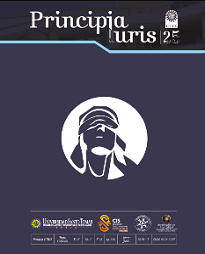BETWEEN ANTI-SPECIESISM AND THE RIGHT OF ANIMALS (APPROXIMATIONS FOR A PHILOSOPHICAL FOUNDATION)
Main Article Content
Abstract
Article Details
Por medio de esta comunicación certifico que el artículo que estoy presentando para posible publicación en la revista institucional impulsada de la Facultad de Derecho de la Universidad Santo Tomás seccional Tunja, Principia Iuris, es de mi entera autoría, siendo sus contenidos producto de mi directa contribución intelectual.
Todos los datos y referencias a publicaciones hechas están debidamente identificados con su respectiva nota bibliográfica y en las citas que se destacan como tal.
Por todo lo anterior, declaro que el material presentado se encuentra conforme a la legislación aplicable en materia de propiedad intelectual, y por lo tanto, me hago responsable de cualquier reclamación relacionada a esta.
En caso de que el artículo presentado sea publicado, manifiesto que cedo plenamente a la Universidad Santo Tomás seccional Tunja los derechos de reproducción del mismo y accedo a las modificaciones que de forma se requieran para adaptarse a la estética de la revista. Como contraprestación de la presente cesión, declaro mi conformidad de recibir (2) ejemplares del número de la revista en que aparezca mi artículo.
References
Antoine, S. (2003). Rapport sur le statut des animaux. París: Puf.
Arango, R. (2002). Derechos Sociales Fundamentales. Pensamiento Jurídico.
Bentham, J. (2002). Tratado de las pruebas judiciales. Madrid: Comares.
Descartes, R. (1981). Discurso del método. Madrid: Espasa-Calpe.
Grocio, H. (1987). El derecho de presa. Del derecho a la guerra y de la paz. Madrid: Centro de estudios constitucionales.
Halliday, M. L. (1998). El lenguaje como Semiótica Social. Bogotá: Fondo Cultura Económica.
Hierro, L. (2002). El concepto de justicia y la teoría de los derechos. Madrid: Estado y Derecho.
Kafka, F. (2003). La Metamorfosis. Bogotá: Panamericana.
Kant, E. (1988). Fundamentación de la metafísica de las costumbres. Madrid: Espasa Calpe.
Nieto, S. P. (2009). “Religión y animales, conflicto y protección”. Evento organizado por el Colegio de Abogados (ICAB) (p. 56). Barcelona España: SF.
Pico Della Mirandola, G. (2004). Discurso sobre la Dignidad del Hombre. México: Universidad Nacional Autónoma.
Ramdane, B. (1999). L’animal et le droit: à propos de la Déclaration des droits de l’animal. Revue juridique de l’environnement, 16.
Reale, M. (1997). Teoría tridimensional del derecho. Madrid: Tecnos.
Sagrada Biblia. (2000). Versión Reina Valera. Traducción Holman (EE. UU., Tennesee).
Singer, P. (1999). Liberación Animal. Madrid: Trotta.
______. (23 de abril de 2003). Revista Crítica del presente. Recuperado el 25 de enero de 2016, de: http://www.nodulo.org/ec/2003/n014p10. htm#kn01
Sentencia T-451 (Corte Constitucional Colombiana, 10 de marzo de 1992).
Tugendhat, E. (1992). Justicia y derechos humanos. Barcelona: Universidad de Barcelona.
Valdés, G. (2006). ¿Cuál es la relevancia moral de la dignidad humana? México: El positivismo jurídico.
Villanueva, O. et al. (1992). Biófilo panclasta. Bogotá: Proyecto Cultural Alas.

